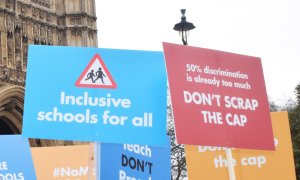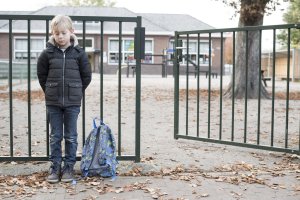CAMPAIGN ALERT: Save the 50% cap on faith school admissions
The government is planning on scrapping the 50% cap on faith-based admissions at new academies. This will lead to a new wave of appallingly discriminatory faith schools.
Join us in calling on the government to keep the 50% cap. Write to your MP today.
State-funded faith schools can discriminate against children whose families don't share their religion.
This is unfair, unjust and toxic for social cohesion.
Join our campaign for inclusive schools for all children, from all communities.
All children should be able to go to their local school without facing discrimination because of their family's religion or beliefs.
But faith schools have exemptions from equality law, which means they can discriminate against prospective pupils whose families don't share the religion of the school. In these cases schools will usually demand evidence of baptism or religious practice from a minister of religion.
When oversubscribed, new free schools in England with a religious designation can select up to 50% of their pupils based on their religiosity. Voluntary aided schools, including those which have become academies, can select 100% of pupils in this way.
Similar issues exist with schools in Scotland and Wales too. Catholic denominational schools in Scotland can require a baptism certificate for prospective pupils, while voluntary aided and foundation faith schools in Wales can apply faith-based admissions criteria when oversubscribed.
Discriminatory admissions arrangements disadvantage local children whose parents are non-religious or of a different religion to the school's religious designation. Many parents find that because of their lack of religious belief, they are unable to send their children to their local state school, which is often the most appropriate school for their needs.
Religious selection in schools is discriminatory, entrenches religious segregation in wider society, and often leads to ethnic and socio-economic segregation too. The UN Committee on the Rights of the Child (UNCRC) has called for an end to religious selection at schools in England.
In a society as diverse as ours, rather than facilitating segregation along religious lines, the Government should be doing everything it can to ensure that children of all faiths and none are educated together in inclusive schools.
We want to see an end to the exemptions from equality law that allow faith schools to religiously select children in this way.
- The UK is only one of four countries in the OECD where state-funded schools can use religious selection in admissions.
- 72% of voters oppose state funded schools, including faith schools, being allowed to select or discriminate against prospective pupils on religious grounds in their admissions policy, including 68% of Christians.
- Just 17% of respondents agree with the statement: "Publicly funded schools should be able to select pupils on the grounds of their religious beliefs".
In 2018, following huge public opposition rallied by the NSS and others, the government abandoned its plans to scrap the 50% cap on religious discrimination in free school admissions. But the government has sought to appease religious lobby groups by making it easier for faith groups to open new voluntary-aided faith schools, which can select 100% of pupils on faith grounds. This is regressive and will increase social division and inequality.
The time has come to end religious discrimination and segregation in our schools – not extend it.
Take action!
1. CAMPAIGN ALERT: Write to your MP
The government plans to remove the 50% cap on faith-based admissions at academies. Please call on your MP to keep the cap.
2. Share your story
Tell us why you support this campaign, and how you are personally affected by the issue. You can also let us know if you would like assistance with a particular issue.
3. Join us
Become a member of the National Secular Society today! Together, we can separate religion and state for greater freedom and fairness.
Latest updates
NSS joins open letter against faith school discrimination
Posted: Sun, 14 Apr 2024 18:45
Education experts, politicians, religious leaders and public figures unite to call on Education Secretary to keep the faith school admissions cap.
NSS urges PM to retain cap on faith-based admissions
Posted: Wed, 10 Apr 2024 08:27
Supporters of inclusive schools encouraged to tell MPs to protect the 50% cap.




